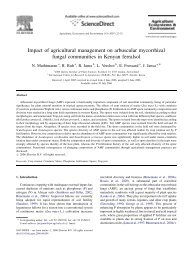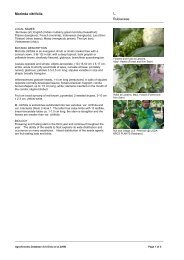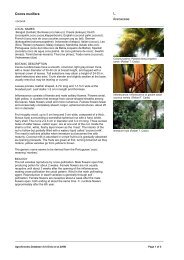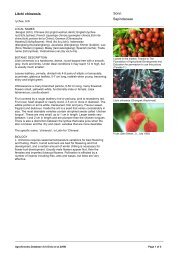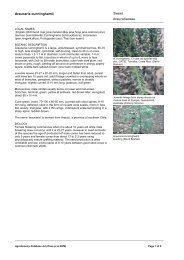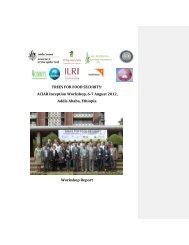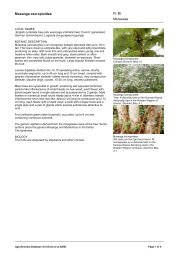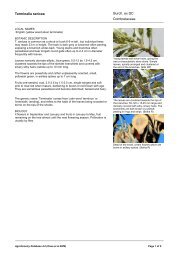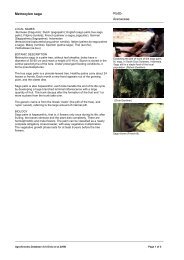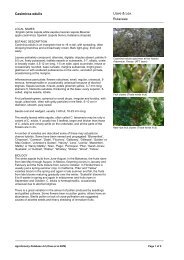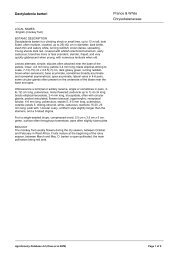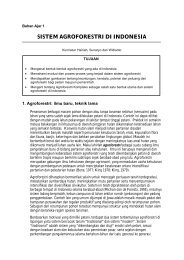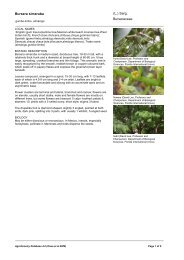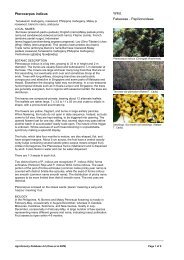Peach palm - World Agroforestry Centre
Peach palm - World Agroforestry Centre
Peach palm - World Agroforestry Centre
Create successful ePaper yourself
Turn your PDF publications into a flip-book with our unique Google optimized e-Paper software.
2 <strong>Peach</strong> <strong>palm</strong>. Bactris gasipaes Kunth<br />
The International Plant Genetic Resources Institute (IPGRI) is an autonomous<br />
international scientific organization operating under the aegis of the Consultative<br />
Group on International Agricultural Research (CGIAR). The international status of IPGRI<br />
is conferred under an Establishment Agreement which, by March 1997, had been signed<br />
by the Governments of Algeria, Australia, Belgium, Benin, Bolivia, Brazil, Burkina Faso,<br />
Cameroon, Chile, China, Congo, Costa Rica, Côte d’Ivoire, Cyprus, Czech Republic,<br />
Denmark, Ecuador, Egypt, Greece, Guinea, Hungary, India, Indonesia, Iran, Israel, Italy,<br />
Jordan, Kenya, Malaysia, Mauritania, Morocco, Pakistan, Panama, Peru, Poland, Portugal,<br />
Romania, Russia, Senegal, Slovak Republic, Sudan, Switzerland, Syria, Tunisia, Turkey,<br />
Uganda and Ukraine. IPGRI’s mandate is to advance the conservation and use of plant<br />
genetic resources for the benefit of present and future generations. IPGRI works in<br />
partnership with other organizations, undertaking research, training and the provision of<br />
scientific and technical advice and information, and has a particularly strong programme<br />
link with the Food and Agriculture Organization of the United Nations. Financial support<br />
for the research agenda of IPGRI is provided by the Governments of Australia, Austria,<br />
Belgium, Canada, China, Denmark, Finland, France, Germany, India, Italy, Japan, the<br />
Republic of Korea, Luxembourg, Mexico, the Netherlands, Norway, the Philippines, Spain,<br />
Sweden, Switzerland, the UK and the USA, and by the Asian Development Bank, CTA,<br />
European Union, IDRC, IFAD, Interamerican Development Bank, UNDP and the <strong>World</strong><br />
Bank.<br />
The Institute of Plant Genetics and Crop Plant Research (IPK) is operated as an independent<br />
foundation under public law. The foundation statute assigns to IPK the task of conducting basic<br />
research in the area of plant genetics and research on cultivated plants.<br />
The geographical designations employed and the presentation of material in this<br />
publication do not imply the expression of any opinion whatsoever on the part of IPGRI,<br />
the CGIAR or IPK concerning the legal status of any country, territory, city or area or its<br />
authorities, or concerning the delimitation of its frontiers or boundaries. Similarly, the views<br />
expressed are those of the authors and do not necessarily reflect the views of these<br />
participating organizations.<br />
Citation:<br />
Mora-Urpí, Jorge, John C. Weber and Charles R. Clement. 1997. <strong>Peach</strong> <strong>palm</strong>. Bactris<br />
gasipaes Kunth. Promoting the conservation and use of underutilized and neglected crops.<br />
20. Institute of Plant Genetics and Crop Plant Research, Gatersleben/ International Plant<br />
Genetic Resources Institute, Rome, Italy.<br />
ISBN 92-9043-347-7<br />
IPGRI IPK<br />
Via delle Sette Chiese 142 Corrensstrasse 3<br />
00145 Rome 06466 Gatersleben<br />
Italy Germany<br />
© International Plant Genetic Resources Institute, 1997



